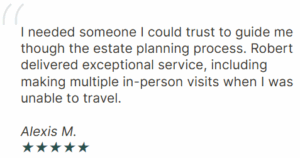Why Estate Planning Matters for Solo Agers: Insights from an Estate Planning Attorney

When you’re aging on your own—without a spouse, partner, or children—planning for the future can feel both empowering and overwhelming. Many solo agers wonder, “Who will speak for me if I can’t? Who will make sure my wishes are carried out?”
Recently, Attorney Robert A. Heinimann, Jr., sat down to talk about estate planning and why it’s more than just writing a will. His insights cut through common misconceptions and highlight why solo agers, in particular, should take estate planning seriously.
Beyond the Will: What Estate Planning Really Means
“Generally estate planning involves planning for one’s passing and for one’s incapacity,” Attorney Heinimann explains. Many people think of a last will and testament as the centerpiece of estate planning—and while it’s important, it’s only one piece of the puzzle. A will outlines who will manage your estate and where your assets will go, but it doesn’t cover what happens if you’re still alive yet unable to make decisions.
Trusts: A Tool, Not a One-Size-Fits-All Solution
Trusts often come up in conversations about estate planning, but Attorney Heinimann is clear that they aren’t for everyone. “Trusts are not suitable for every individual,” he says. Whether a revocable or irrevocable trust is right for you depends on your unique circumstances: the assets you hold, where they’re located, your financial situation, and your personal goals. For solo agers, trusts can be especially useful when you want to streamline the distribution of your estate or avoid complications for the people you’ve chosen to carry out your wishes.
Planning for Incapacity: The Step Many People Skip
One of the most overlooked parts of estate planning is preparing for a time when you may not be able to make decisions for yourself. Attorney Heinimann emphasizes that incapacity planning is crucial. He highlights two key documents:
- Durable Power of Attorney – Names someone you trust to handle financial matters if you’re unable.

- Appointment of a Healthcare Representative – Ensures someone can make medical decisions on your behalf.
For solo agers, these documents are essential. Without a spouse or children to step in naturally, you’ll want to designate someone you trust—whether that’s a sibling, a close friend, or even a professional fiduciary.
What Happens Without a Plan
Without these safeguards in place, families or attorneys for those without families often find themselves turning to the probate court for a process known as conservatorship—a stressful and costly legal procedure to appoint someone to manage your affairs.
“Sadly, we see this too often,” Attorney Heinimann notes. “It can be avoided with just a few proactive steps.”
Taking Control of Your Future
Estate planning doesn’t have to be complicated, and it’s not just for the wealthy. For solo agers, it’s about peace of mind—knowing your voice will still be heard even if you’re unable to speak for yourself.
Attorney Heinimann partners with SoloAgersConnect to provide compassionate, practical estate planning services tailored to people aging on their own. To learn more or schedule a free consultation, visit heinimannlaw.com.
To see the video interview with Atty. Robert A. Heinimann, Jr., discussing estate planning from which this blog was crafted, click WATCH VIDEO.
Help us Build Our Solo Agers Community!
SoloAgersConnect.com is a new online hub for solo agers and elder orphans to easily locate the services and information they need and connect with similar people to build community and develop friendships.
If you found this article helpful, please sign up to receive the newsletter !
Be sure to find us on Facebook and join the Solo Agers Connect group. Let’s grow our community, share information and resources, and build community and friendships.
